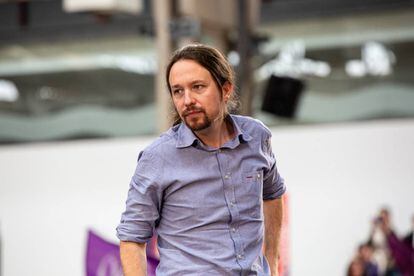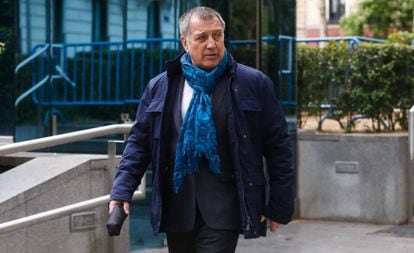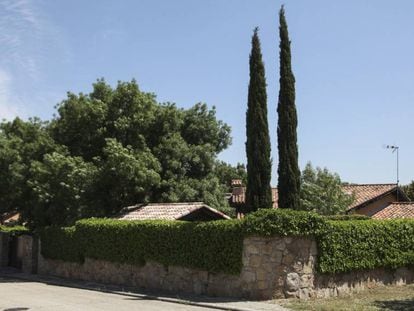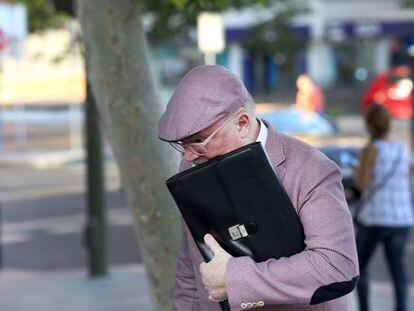The “cesspit of the Spanish state,” under scrutiny by the courts
Judges are investigating moves by politicians and police officials to find or fabricate damning evidence against political rivals of the Popular Party

A group of high-ranking police officials working for the Spanish Interior Ministry carried out special jobs to damage the reputation of political rivals of the Popular Party (PP) during the administration of former Prime Minister Mariano Rajoy.
This group, known informally as the “Patriotic Brigade,” was tasked with finding – or fabricating – evidence against political adversaries, particularly during election campaigns or periods of political turmoil. These operations are now being investigated by the courts.
After working for three years to erode the prestige of Catalan politicians, the Patriotic Brigade switched targets to Podemos
The release of these reports, many containing phony information, was timed to cause the greatest possible damage, and the police leaked them to the media before handing them to the judges.
Leaders of Podemos, one of the main targets of this covert action, say they feel victims of foul play by what they describe as “las cloacas del Estado” (“the cesspit of the state”) The party has asked the investigating judge to determine whether any journalists are also involved in the scheme.
Villarejo
Spain’s High Court, the Audiencia Nacional, is currently investigating these events as part of a sweeping spying case featuring former police chief José Manuel Villarejo. The latter is at the center of a case involving 20 years’ worth of phone taps, undercover recordings and other invasions of privacy against scores of politicians, business people, judges and journalists. Villarejo is thought to have ordered a trickle of recent leaks to the media, all of which have caused embarrassment to several high-profile individuals, including former Spanish King Juan Carlos I and Justice Minister Dolores Delgado.
But Villarejo is not the only member of this police network: around six police chiefs and inspectors have been targeted by the court investigation. The judge has also asked the National Police’s Internal Affairs Unit to sift through all the documents that were confiscated from Villarejo in search of evidence of “commercial relations or agreements […] with journalists or media outlets” and “payments or other forms of compensation linked to news involving information-intoxication projects, leaks of confidential data or media manipulation.”
In other words, the judge wants to know whether, besides police officers and politicians, there were also journalists involved in the alleged scheme. The first investigations by the Internal Affairs Unit in connection with possible ties between Villarejo and the reporters Daniel Montero from El Español and Manuel Cerdán from Okdiario have not yielded any information that might suggest such a link. Queried by EL PAÍS, Cerdán declined to comment and Montero merely expressed “respect for the ongoing investigation.”

The police group under investigation has been in charge of several major operations, including the following:
Catalonia
The earliest known work by the Patriotic Brigade coincided with early elections in Catalonia in the fall of 2012. A police report with no date or signature, and which nobody at the Interior Ministry has ever taken responsibility for, listed several alleged crimes by politicians with pro-independence sympathies.
The report claimed that Jordi Pujol, who served for 23 years as the Catalan premier, was concealing €137 million is Swiss bank accounts, and that his successor Artur Mas shared part of that fortune, which came from illegal commissions.
A year later, the same police officers obtained evidence about the fortune held in Andorra by the Pujols, who made €40-million deposits for years. In January 2015, Pujol told a judge that the money was an inheritance from his father, but produced no evidence. The courts are still investigating the origin of that money.
Podemos
A new general election was held in December 2015, and the anti-austerity party Podemos secured 69 seats in Congress, becoming the third-largest force in Spain. After working for three years to erode the prestige of Catalan politicians, the Patriotic Brigade switched targets.
On January 16, 2016, the online dailies OKdiario and El Confidencial published information regarding alleged illegal party financing by Podemos, a story that involved funds from Iran. The investigation was begun by the police’s Tax and Financial Crimes Unit (UDEF) a few days before the election, but the unit did not file a complaint with the Audit Court until two months after the news reports, following orders from their superiors.
Even before the UDEF had taken the matter to court, a far-right union called Manos Limpias and a small political party named Spanish Civic Union-Party for Peace, Reconciliation and Progress in Spain filed suits against Podemos in the Supreme Court and the High Court based on this report, which was named “Informe PISA” (informe meaning report, and PISA an acronym of Pablo Iglesias’s initials and S. A., meaning limited company). The legal action was shelved in both cases.
Then, in April 2016, several police chiefs traveled to New York to meet with a former Venezuelan minister named Rafael Isea at the Spanish consulate. The Spanish delegation asked Isea, who had once served as finance minister under Hugo Chávez, for documentary evidence of illegal financing by Podemos. One inspector named José Ángel Fuentes Gago said: “If you can help us ensure that the Podemos folks don’t reach [power], better for everyone.”
A month later, just ahead of a new general election in Spain, this same group handed Okdiario fake documents obtained from a police informer in order to create a new scandal. According to this information, the Nicolás Maduro government had paid Podemos leader Pablo Iglesias $272,000 through a bank in the Grenadines in 2014.
The alleged bank statement was fake, as the lender itself has confirmed. It was created with online screenshots, and the names of Venezuelan ministries had been changed. The informer who provided this information was himself a Venezuelan citizen who was granted a special residency permit in Spain as a reward for his cooperation.

A top police official named Eugenio Pino has stated in Congress that officers flew to Venezuela and Miami in early 2016 to investigate this alleged illegal financing, but no legal proceedings stemming from this investigation ever prospered in the courts.
The pen drive
It did not end there. In July 2016, Okdiario revealed a private group conversation between Podemos leaders alluding to sexist comments made by Pablo Iglesias. The judicial investigation has determined that it was the police chief Villarejo who had passed that information along to selected journalists.
Villarejo has told the court that he himself obtained the information from a news magazine named Interviú, which had itself received an envelope with no return address containing the memory card of a cellphone stolen a few months earlier from a top aide of Iglesias at the European Parliament. Antonio Asenso, the chairman of Zeta Group, the parent company of Interviú (which ran its last issue in January 2018 after 42 years on newsstands) decided not to publish the contents of the card and had it returned to Iglesias.
But Villarejo, who had close ties with the magazine and often supplied it with useful information, asked reporters for the contents of this memory card. Alberto Pozas, the magazine editor at the time, was charged on Monday with disclosure of secrets by High Court Judge Manuel García-Castellón, who is in charge of one of the separate investigations in the sprawling Villarejo case. Pozas, who had been called in as a witness, on Monday admitted that he gave Villarejo a pen drive with the information that he wanted. This pen drive was found in Villarejo’s home during a police raid.
English version by Susana Urra.












































